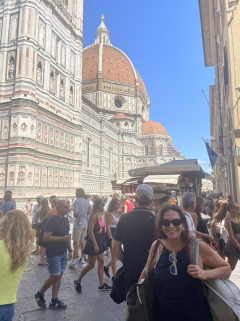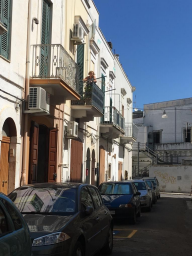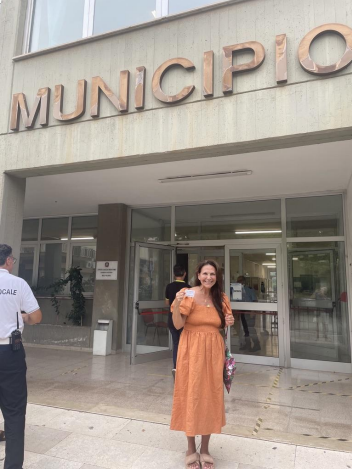Anna Coccaro
Major: Multidisciplinary Studies
Guiliano Fellow, Spring 2022
The Effects of Covid-19 Lockdown on a Small Southern Italian Town: Mola di Bari
The Covid-19 Pandemic has had a devastating effect throughout the world. Although it was somewhat controlled in 2022, people are still feeling the repercussions in the United States and abroad. Italy was one of the most impacted countries in the beginning, hence they were among the first to adopt strict and debilitating lockdowns. Culturally, Italy is a socially driven society where daily interactions within one family and the larger community are a driving force. Italy, especially in the southern part, is a very family-oriented country. It is not unusual to see many generations living within the familial home, which is passed down from generation to generation. The responsibility of caring for the elderly within one's family is the utmost priority. The piazzas, squares, and outside markets contribute to the socialization necessary for Italy’s existence. People meet in these locations to exchange news, dialogue, shop, exchange ideas, discuss politics, gossip, and socialize. These lockdowns forced people to change their relationships with the social world and their communities. Adding to that was the fear and anxiety about the disease and the uncertainty of how it spreads and kills. The restrictions to their daily interplay had a devastating effect on their physiological well-being, their sense of connection, and their emotional bonds.
 My ancestral home is Mola di Bari, a small coastal town in southeastern Italy in the
province of Puglia twenty minutes south of Bari by car. The population is roughly
thirty thousand, swelling to fifty thousand in the summer months. It is rich in history,
with a castle and church from the 13th century. Roman Catholicism is deeply rooted
in the fabric of its society; attending mass, devotion to saints, and rituals are a large
part of their daily lives. Weddings and baptisms are a huge part of their social ca
lenders. Mola di Bari or as locals call it, Mia Paese (My Town), is a close-knit fishing
and farming community, where business consists of the locals selling their products
from family-owned stores, and/or their homes. Farmers gather their harvest and put
them in boxes on chairs in front of their homes. These homes have been passed down
from generation to generation, so there is a familiarity among customers, as they
have a long-standing relationship between them. Baked goods, pastries, cooking oil,
wine, and many others food products are produced by the citizens who sell their wares
from their homes or nearby shops. There is much pride in what is sold, as they are
often recipes and traditions passed down from generation to generation. The vegetables
are grown on land owned by their ancestors. People casually walk by to make purchases,
knowing of the history passed down. Buying just a few vegetables can frequently take
an hour for each stop, as a conversation about children, relatives, church functions,
etc. is inevitable. These pleasantries while conducting business are an integral part
of socializing while they catch up on local gossip, community news, and politics.
Almost everyone knows one another, and they take pride in their community. In Italy
back then, as now, shopping was done daily for fresh produce, bread, meat, fish, and
cheese. As a child, I would return each summer to visit my grandparents. My fondest
memories were of accompanying my grandmother as she shopped at the local “stores”
for the daily meal.
My ancestral home is Mola di Bari, a small coastal town in southeastern Italy in the
province of Puglia twenty minutes south of Bari by car. The population is roughly
thirty thousand, swelling to fifty thousand in the summer months. It is rich in history,
with a castle and church from the 13th century. Roman Catholicism is deeply rooted
in the fabric of its society; attending mass, devotion to saints, and rituals are a large
part of their daily lives. Weddings and baptisms are a huge part of their social ca
lenders. Mola di Bari or as locals call it, Mia Paese (My Town), is a close-knit fishing
and farming community, where business consists of the locals selling their products
from family-owned stores, and/or their homes. Farmers gather their harvest and put
them in boxes on chairs in front of their homes. These homes have been passed down
from generation to generation, so there is a familiarity among customers, as they
have a long-standing relationship between them. Baked goods, pastries, cooking oil,
wine, and many others food products are produced by the citizens who sell their wares
from their homes or nearby shops. There is much pride in what is sold, as they are
often recipes and traditions passed down from generation to generation. The vegetables
are grown on land owned by their ancestors. People casually walk by to make purchases,
knowing of the history passed down. Buying just a few vegetables can frequently take
an hour for each stop, as a conversation about children, relatives, church functions,
etc. is inevitable. These pleasantries while conducting business are an integral part
of socializing while they catch up on local gossip, community news, and politics.
Almost everyone knows one another, and they take pride in their community. In Italy
back then, as now, shopping was done daily for fresh produce, bread, meat, fish, and
cheese. As a child, I would return each summer to visit my grandparents. My fondest
memories were of accompanying my grandmother as she shopped at the local “stores”
for the daily meal.
When the lockdowns began in the USA, in March 2020, we as New Yorkers and Americans were deeply impacted. According to the results of a study in the Journal of Clinical Medicine by Epifanio MS et al.(1), “just a few weeks after the outbreak ofCOVID-19 in Italy and a few days after the declaration of the restrictive measures, 5.1%of the respondents reported PTSD symptomatology linked to the COVID-19 diffusion,and 48.2% evidenced lower psychological well-being, characterized by anxiety anddepressive symptoms, negative well-being, perception of loss of control, less vitality,and lower general perceived health.”
I couldn't help but think and worry about my family in Italy and how their lives would be affected by Italy’s more restrictive lockdown. Italy was the first country to enact a Covid-19 lockdown nationwide. I decided to go back to Italy in August 2022, and am grateful for the opportunity through the Edward Guiliano Global Fellowship Program to do so. I wanted to see firsthand the effects the lockdown had on ordinary people, their day-to-day existence, and their small businesses. Furthermore, I revisited traditional home-based stores and local stores, which I frequented during my childhood. I even went to Florence for three days to compare and contrast how the locals in a big city fared with their restrictions.
 In Mola di Bari, my ancestral home, a population of roughly 50 thousand, 50 died of
Covid during the first year. I was fortunate to get an interview with the mayor (Sindaco) of Mola di Bari, Dott. Giuseppe Colonna to get
his perspective on how lockdowns affected Mola and what protocols he had initiated.
He stated, firstly, his concern for the most vulnerable, the elderly and women who
were alone with children; making it a priority to visit and bring them food and assistance
every week. Secondly, he kept the population informed by placing manifestos throughout the town and information through
local television. I interviewed proprietors at the local fish store, produce store,
pharmacy, shoe store, and bakery, as well as “lifting the curtain” and entering the
“home stores” to talk with the owners. Many remembered my grandmother and me from years ago and were
willing to talk at length about their Covid-19 experiences. All describe the sense
of fear, uncertainty, and isolation they felt, and are so grateful that life has somewhat resumed. Last, but not least, I was able to interview a local police officer
to gain his perspective on the handling of locals with all the lockdowns that were
imposed on the citizens. His personal story was interesting, as his wedding was planned
for early April 2020, and he was forced to postpone the church ceremony and reception
until August 2022.
In Mola di Bari, my ancestral home, a population of roughly 50 thousand, 50 died of
Covid during the first year. I was fortunate to get an interview with the mayor (Sindaco) of Mola di Bari, Dott. Giuseppe Colonna to get
his perspective on how lockdowns affected Mola and what protocols he had initiated.
He stated, firstly, his concern for the most vulnerable, the elderly and women who
were alone with children; making it a priority to visit and bring them food and assistance
every week. Secondly, he kept the population informed by placing manifestos throughout the town and information through
local television. I interviewed proprietors at the local fish store, produce store,
pharmacy, shoe store, and bakery, as well as “lifting the curtain” and entering the
“home stores” to talk with the owners. Many remembered my grandmother and me from years ago and were
willing to talk at length about their Covid-19 experiences. All describe the sense
of fear, uncertainty, and isolation they felt, and are so grateful that life has somewhat resumed. Last, but not least, I was able to interview a local police officer
to gain his perspective on the handling of locals with all the lockdowns that were
imposed on the citizens. His personal story was interesting, as his wedding was planned
for early April 2020, and he was forced to postpone the church ceremony and reception
until August 2022.
Arriving in my ancestral town in August 2022, I immediately noted that there was a generational division in how people dealt with the pandemic. The older people were still wearing masks and still so frightened of contracting Covid. They still were adhering to the 1-meter distance rule, and the usual hugging and kissing were sadly gone as they apologized for not being as demonstrative as they once were. The younger people were of a different mindset, wore no masks, and were not concerned with getting sick; they just didn’t want to live in fear any longer and wanted to resume life pre-pandemic. The corner vegetable store by my grandmother's house was now taken over by the original owner’s grandson, Nico. He stated that the new restrictions that were imposed on the town were enforced by police officers. Grocery shopping and visits to the local pharmacy for prescriptions were permitted once a day, with one person per family allowed outside. The healthiest member would do the shopping. Nico described people lined up for blocks; each wearing masks and adhering to the distance rules. On March 9, 2020, Italy’s Prime Minister, Giuseppe Conte, imposed a national lockdown. Quarantine measures were expanded, including restricting travel to other municipalities. In the country, the oldest and the youngest of the family were not permitted to leave home to ensure their safety. The local police monitored the streets to ensure no one was out walking, exercising, or gathering unnecessarily. Gone was the ability to take walks, bring children to parks, and attend mass. Churches, schools, and most stores were closed, except for the pharmacies and some large chain supermarkets. Police officers were outside, permitting just a few people in the stores at the same time; lines were formed for blocks. If anyone was on the streets, police officers were instructed to issue fines; although, during my investigation, no one in town was given any. People have told me that the police officers were sympathetic to what was going on, and did all they could to keep people safe, calm, and informed. I interviewed Pietro, a police officer, and his fiancé Marianna, both of whom were in their early 30s, were set to be married in the early months of Covid but had to postpone their wedding plans. He had been working up north and was not permitted to return home for six months. Their story was especially interesting, as the lockdown caused their church ceremony, and many other couples' celebrations, to be postponed. Pietro states the separation from his family was especially difficult because he was not able to assist his elderly parents. Phone communication via FaceTime was crucial in letting family members know how each other was doing, and that care was delegated to other family members. He describes that in Milan, ambulances and hospitals were filled to capacity with sick people and that the city, though in lockdown, was chaotic as the homeless population was especially affected.
The fish stores and markets were all closed as fishing was prohibited in Mola from March 2020-May2020. Fishermen were especially concerned as their main source of income had now been halted. Many men were stressed as they were not given money by the government and their families' resources were now being stretched. This loss of income was especially detrimental to the fishing community; most were self-employed and had to rely on their savings while they waited for restrictions to be lifted. I also spoke to a local shoe store owner who again had been in business for generations and was unable to reopen his businesses because people after the pandemic lost so much income that their spending habits were forced to change. I also visited the nearby pharmacy, which was kept open six days a week because they are considered part of essential health care in Italy; pharmacists dispense many medicines like doctors here in the USA. What I found interesting and creative in the “Italian manner”, was how the townspeople thought of creative excuses to visit just the pharmacy, so they could go out for a walk. The police officers were complicit, letting them visit the pharmacy as often as they wanted.
In Florence, I spoke to many restaurant and café owners, who stated they had the same fears and worries as the people in Mola di Bari had. However, in Florence, their main source of income was dependent on tourism. Even in 2022, they were recovering financially as the loss of income and spending habits of all people changed. One 87-year-old woman who I spoke with stated she lost her business and with no children to care for her in this later part of life, she was tired and ready for her life to be over.
Many young people who had worked at restaurants before the pandemic stated they lost their jobs and were forced to live with family in small apartments; they felt trapped and oftentimes sad, as career opportunities were both halted and/or changed. Through social media, however, they were able to stay connected to friends. Like young people in Mola di Bari, they relied heavily on social media and FaceTime to stay connected to friends and credit that with helping their mental well-being. Though they had fear and anxiety, they felt optimistic about the future. I spoke with many young people (18-27) and interestingly enough, although they had concerns and some fear, they were incredibly resilient. It was the older generation who seem to have suffered in a way that they were fearful of new diseases in the future. They were not as comfortable with the internet and had no desire to change the practices they conducted in both their social life and their business.
What I found most interesting, was that younger people have returned to Mola di Bari, and stayed. They stated that the pandemic has brought them a greater appreciation of small-town living, family, and a sense of community. Many had been in the big cities for work or school. During and after Covid, changes in society brought the young the ability to work from home and attend school at home via the internet, which ironically led to the young returning to their hometowns where they re-established their connections with their family and their small-town values. They stated Covid changed them in a sense that it forced them to reevaluate life and what is most important. Many expanded their parent's businesses and changed them for the better, yet keeping the same traditions of community and values and overall better way of life. The pandemic has changed many practices of how people live, but I realize that through it all is hasn't changed their drive to work hard, care for their friends and family and their resilience to move forward through whatever challenges that may occur in the future. Their sense of culture, family, traditions, and love of life continues.
The Guiliano Global Fellowship Program offers students the opportunity to carry out
research, creative expression and cultural activities for personal development through
traveling outside of their comfort zone.
GRADUATE STUDENT APPLICATION INFORMATION
UNDERGRADUATE STUDENT APPLICATION INFORMATION
Application Deadlines:
Fall deadline: October 1 (Projects will take place during the Winter Session or spring semester)
Spring deadline: March 1 (Projects will take place during the Summer Session or fall semester)
Please submit any questions here.
